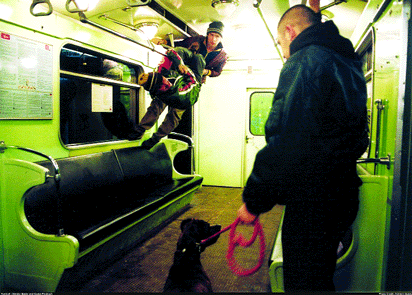Budapest’s subway system is the creepy playground for psychotic killers
This first feature film by Nimrod Antal begins on a strange note. A representative of the Budapest Public Transport Company informs the audience that it bears no resemblance to reality. While some of his colleagues wanted to prohibit Antal from shooting the film in the Budapest subway, this man trusts that spectators will understand that the film’s really about a symbolic struggle between good and evil.
Never before have I seen such an elaborate disclaimer, and I don’t think it’s a joke. To a certain extent, those bureaucrats’ fears are well-grounded, given that “Kontroll” depicts ticket inspectors engaging in violent and other dangerous behaviors, but the film could hardly be any more grounded in fantasy or mythology and removed from conventional ideas of social realism.
Bulcsu (Sandor Csanyi) works as a subway inspector. He and his co-workers spend most of their time on the trains, asking passengers to show their tickets. Not surprisingly, this job makes them a target of anger and scorn. Stuck underground all day, the men start to lose touch with the outside world and don’t socialize with any outsiders. The subway is a violent place, haunted by a figure who pushes people in front of oncoming trains and a baseball bat-wielding gang who beats up the inspectors.
Spending day and night wandering the tunnels, Bulscu grows used to this strange lifestyle, but that changes when he falls in love with Sofia (Eszter Bela) and starts to see the appeal of the outside world again.
The Budapest subway stations are cleaner and shinier than New York’s, but their trains are still tagged with graffiti. There are no exteriors in “Kontroll,” hence no escape from ugly fluorescent lights and echoing rumbles. Bulcsu is stuck in the underworld. Everyone’s skin looks sickly and pale, as if they haven’t seen the sun in weeks. The subway workers make up a clique of their own, with its own rituals, such as eating breakfast together early each morning, and games.
Stylized lighting dominates––a red glow bathes a confrontation between Bulscu and his boss. Neo’s score veers between techno-rock and brooding, jazzy tones that enhance the gloomy atmosphere. “Kontroll” creates a world all its own, so successfully that it took me a few minutes to adjust to the real world’s light after it ended.
Antal could not have created a more powerful or memorable setting. However, he’s less adept at filling that space. His attempts at humor are scattershot, relying on borderline homophobic and racist caricatures, such as a gay man who tries to flirt his way to a free ride and a group of Asian tourists who claim not to understand Hungarian but keep snapping photos of the ticket inspector. Despite these red flags, “Kontroll” won a prize at the Aspen Comedy Festival. Antal does create a hilarious montage of subway workers telling their problems to a psychiatrist.
Antal is better at creating a mood that slowly turns uglier and weirder. Not since Walter Hill’s 1979 gang saga “The Warriors” have the subways felt so threatening. At first, the inspectors’ behavior seems odd but believable. Oblivious to the fact that he’s smoking a cigarette, a middle-aged man lectures his younger colleague about the dangers of eating saturated fats. The scene ends with the latter choking on a French fry and passing out with his face in a pool of ketchup.
The inspectors face a surreal level of hostility, but their reactions are even stranger. After being assaulted, no one calls the police or even bothers putting a Band-Aid over their cuts. For two-thirds of “Kontroll,” Bulscu’s face is dabbed with dried blood.
Perhaps “Kontroll” originated as a fantasy born out of spending too much time waiting for an arriving train. Using everyday life as a springboard for its more outlandish conceits, this film suggests a new mythos, with serial killers as the contemporary equivalent of the Grim Reaper. More than a story, “Kontroll” is an experience, a place to inhabit for 105 minutes. Few recent films are as hallucinatory and enveloping. Antal hasn’t yet worked out the art of creating a compelling narrative, but I’m confident that he can create another space as powerful as hell’s subway tunnels.
gaycitynews.com
































